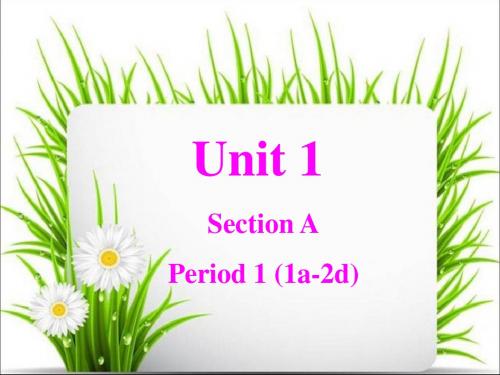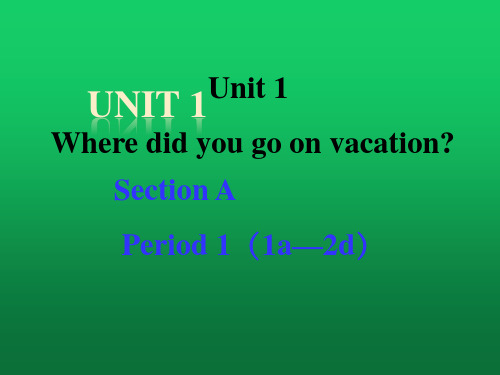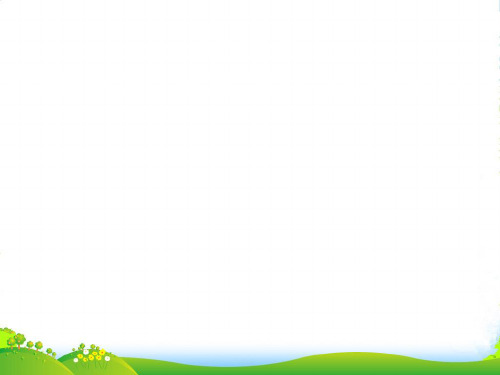人教版新目标八年级英语上册Unit 1 Period 2公开课课件
人教版新目标英语八年级上册unit1(共72张PPT)

always 总是 A
Usually / B
often 通常
Sometimes C
有时
hardly ever D
几乎不
never
E
从不
1b listening
Listen and fill in the blanks:
always(100%) go shopping
usually
exercise
often
= She does well in playing piano. 2,be kind to / be good to 对…好 如:She is very good to us. 3,be good with 和,,,相处的很好 如;Are you good with children?
• 2. want to do sth. 想做某事情
① I always do my homework on weekends. ② I usually / often watch TV. ③ I sometimes listen to music. ④ I hardly ever play computer games. ⑤ I never play soccer.
2a
Listen to the tape. How often does Cheng do different things. Number the activities you hear[1-5]
a, 3
Go to the movies
b, 1
watch TV
C, 5
shop
d, 4
exercise
1b
ቤተ መጻሕፍቲ ባይዱ
a boy
人教新目标八上Unit 1 Section A(1a-2d)自用上课课件

1b Listen and number the people in the picture [1-5].
Where did you go on vacation?I went to
the
2mountai 1 ns.
4531. T来自na2. Xiang Hua
3. Sally 4. Bob 5. Tom
Yes, she / he did. / No, she / he didn’t. She / he ….
PAIRWORK
2c Role-play conversations between Grace, Kevin and Julie.
A: Grace, where did you go on vacation?
Talk about your vacation plans with your friends and fill in the chart.
Name
Vacation plans Who? When?
go with
✔
anyone?
Grace
go to Central
✔
Park?
buy anything special?
✔
2a Listen. Where did the people go on vacation? Complete the chart.
People
Places
Grace New York City (Central Park) Kevin the beach Julie stayed at home
1a Match the activities with the pictures [a-
g].
新目标八年级上Unit1 Section B-2课件(共34张PPT)

Monday? What about on Tuesday?
Yes, she did. Jane had a good time on Monday, but she had a bad time on Tuesday.
Monday, July 15th I arrived in Penang in Malaysia this morning with my family. It was sunny and
paragliding
Read Jane’s diary to learn about her vacation
To learn to write a travel diary
2a Discuss the questions with your partner.
1.What do people usually do on vacation? 2.What activities do you find enjoyable?
4. Jane’s father brought enough money. 5. The food tasted boring.
2b Read Jane’s diary entries about her
vacation and answer the questions.
Did Jane have a good time on
1. What do people usually do on vacation? ( ) eat delicious food ( ) go to the mountain or beach Before you read 2a ( ) swim or tried paragliding ( ) write a diary There’s a survey about other things: ________________________ vacation. Please help me 2. Whatfinish. activities do you find enjoyable? ( ) eat delicious food ( ) go to the mountain or beach ( ) swim or tried paragliding ( ) write a diary other things: ________________________
人教新目标版八年级英语上册Unit 1 Section A (1a-2d)课件

exercise
do homework
go to the movies Weekend activities
read books
play football
go swimming go shopping
watch TV
总结反思
Guessing game
Where did she go on vacation?
Grace go with anyone?
√
go to central park?
√
buy anythiin play volleyball?
√
swim?
√
meet anyone interesting? √
Julie do anything interesting?
√
went to the beach
went to New York City
Did you do your homework last weekend? Did you watch TV last weekend? Did you exercise last weekend? Did you read books last weekend? What did you do last weekend?
study – studied
do- did 见书本P142表格go- went
have- had
is/are- was/were
Where did you go on vacation? What did you do ? How was your vacation ?
Free talk
Where did they go on vacation?
人教版八年级英语上册 Unit1第二课时 教学课件PPT初二公开课

Did you buy anything
Yes, I bought something for
special?
my father.
No, I bought nothing.
How was the food?
Did everyone have a good time?
Everything tasted really good! Oh, yes. Everything was excellent.
Did you go out with anyone? No. No one was here.
Everyone was on vacation.
Did you buy anything
Yes, I bought something for
special?
my father.
No, I bought nothing.
every- 类
everybody 每人;人人 ; 所有人
everyone 每人;人人 ; 所有人
前 some- 类 后
any- 类 no- 类
every- 类
-thing
something 某事;某物
anything nothing 任何东 没有什么 西;任 何事物
everything 每件事; 所有事物;
一般过去时的句式结构
句子类型 含be动词
含行为动词
肯定句
主语 + was/were + 主语 + 动词过去式 + 其
其他.
他.
否定句 主语 + was/were + 主语 + didn’t + 动词原形
not + 其他.
人教版新目标八年级上unit1课件、教案八上Unit 1-1

Unit 1 Where did you go on vacation?(Period 1)导学初稿纠错,总结反思:提高初二英语学习成绩的方法首先要教会科学的学习方法,就是“三习”学习法。
即:课前预先,课上学习,课后复习。
预先发现重点.难点和疑点。
学习时认真听讲.认真思考.复习时要归纳分析知识点使之形成知识版块,从而形成为自己头脑中的知识的一部分。
学好语音和单词,用音形结合记忆法,拼读规则记忆法,分类记忆法,归纳记忆法,搭配记忆法,联想记忆法,卡片记忆法等。
对话与课文要读准意群和句子。
翻译要准确通顺,然后要背诵。
听力要坚持每天抽时间读,听,说练习,并且有针对性地做些练习巩固。
关于语法,初二英语的语法点在初一的基础上有所深入,随着句型和词汇的扩展,语法似乎显得更加复杂。
分散开来好像更加繁杂琐碎,半个学期下来好像突然出现很多个小点,记忆起来很麻烦。
其实不然。
初二的每一个知识点都是初一的稍加拓展,而且知识本身也是相互关联的。
☆比如人称代词,这时的重点已经不是主格和宾格的区分,而是形容词形物主代词、名词性无主代词、反身代词在情景对话以及写作中的应用。
还会涉及到形容词和副词的比较级、高级以及辨析名词的数、各种介词、基数词、序数词☆存在句、祈使句☆比如一般现在时,这时的重点已经不是表达习惯性动作,而是平率副词的使用规则。
还有现在进行、过去进行等等时态的综合训练☆这时也开始深入了解引语的使用、宾语从句、条件状语从句。
其实它们都是我们以前就见过的,甚至很早就见过了,现在我们只是通过更加深入系统的学习使自己在面对这些题时更加从容地得分,提高学习效率。
其实语法是得分的方法,学习语法就是学习得分的方法:比如你看到了某个标志词,你就知道用什么时态;你认识了某个句型,你就知道该填哪个关键词。
其实很快你就会知道语法比你想象得要简单。
学习英语要脚踏实地,没有捷径,但死记硬背也不是好方法。
要大声朗读,反复训练发音器官和耳朵,这样既可以提高听力,又可以改进口语发音,还记了单词。
人教新目标版八年级上册Unit 1 period 2(共16张PPT)

Role-play
Rick: Hi, Helen. Long time no see. Helen: Hi, Rick. Yes, I was on vacation last month. Rick: Oh, did you go anywhere interesting? Helen: Yes, I went to Guizhou with my family. Rick: Wow! Did you see Huangguoshu Waterfall? Helen: Yes, I did. It was wonderful! We took quite a few photos there. What about you? Did you do anything special last month? Rick: Not really. I just stayed at home
Practice the dialogue. 练习这个对话。 A: Did you do anything fun on your vacation?
B: Yes, I did. I went to Sanya.
A: How did you like it? = What did you think of it?
I have something important to tell you. 形容词放在
I don’t have anything new to tell you. 不定代词和 副词后面
Is there anything wrong with you? 我想去安静的
肯定句用some, 否定句或疑问句用any 地方。
She doesn’t see anything. = She _s_e_e_s___ n_o__th_i_n_g_.
人教新目标初中英语八年级上册第1单元Section A 1a—2b-课件

Beijing
Tainan Men Square
a Beijing Hutonn vacation?
Section A
Learning goals
1.Master the new phases in Section A and learn the simple past tense. 2.Through listening ,speaking and cooperation, le. arn to talk about the past things. 3.Describe trip and help others on the trip.
Where did he go on vacation? He went to the mountains.
Where did she go on vacation? She went to the beach.
Where did they go on vacation? They stayed at home.
do anything interesting?
√
√
Julie
study for tests?
go out with anyone?
√
学以致用
composition
根据所画的图片来介绍自己的一次假期旅 行。
学有所得
What have we learnt from this lesson?
homework
People Places
1. Grace 2.Kevin 3.Julie
New York City the beach home
2(b√)L“iYsetesn, Iadgiadin.”.
- 1、下载文档前请自行甄别文档内容的完整性,平台不提供额外的编辑、内容补充、找答案等附加服务。
- 2、"仅部分预览"的文档,不可在线预览部分如存在完整性等问题,可反馈申请退款(可完整预览的文档不适用该条件!)。
- 3、如文档侵犯您的权益,请联系客服反馈,我们会尽快为您处理(人工客服工作时间:9:00-18:30)。
period2
went to New York City went to the beach the mountains stayed at home visited my uncle visited museums
Where did you go on vacation?
Role-play the conversation.
Rick: Hi, Helen. Long time no see. Helen: Hi, Rick. Yes, I was on vacation last month. Rick: Oh, did you go anywhere interesting? Helen: Yes, I went to Guizhou with my family. Rick: Wow! Did you see Huangguoshu Waterfall?
insects in the forest. Most __ of the 5. _____ ___ (大多数) students can get to school early.
Where did you go on vacation?
I went to New York City.
Did you go out with anyone? No ,no one was here. Every one was on vacation. Did you buy anything special? Yes,I bought something for my father. No ,I bought nothing. How was the food? Did everyone have a good time? Everything tasted reallly good. Oh, yes.Everything was excellent.
went to the mountains
Where did you go on vacation?
went to the beach
Where did you go on vacation?
visited the museums
Where did you go on vacation?
visited my uncle
根据汉语提示完成句子。
anyone (任何人)? 1. Did he go out with _________ anything special(特殊的东西) 2. They didn’t buy _______ _______
there yesterday. 3. Tell us __________ something __________ interesting (有趣的事情) about your vacation, Jenny. quite ___ a _____ few (相当多的) 4. They caught _______
Helen: Yes, I did. It was wonderful! We took quite a few photos there. What about you? Did you do anything special last month? Rick: Not really. I just stayed at home most of the time to read and relax. • • • • Long time no see .好久不见 go on a vacation去度假 be on vacation在度假 quite a few 不少,相当多
4. I just stayed at home most of the time to read and relax. most意为“大多数”,后跟可数名 词或不可数名词均可。例如: Most students go to school on foot. 大多数学生步行去上学。
【辨析】 most + 名词 泛指多数,无范围; most + of + the (this/that/those/these等)名 词 ,指某一范围内的多数。 例如: Most of the students go to school by bike. 这些学生们中的多数骑自行车去上学。
2. Did you go anywhere interesting? anywhere意为“在任何地方”,常 用于一般疑问句或否定句中,代替 somewhere。例如: I can’t find my keys anywhere. 我到处找不到我的钥匙。
3. We took quite a few photos there. a few 意为“一些,若干(=some)”,后跟可数 名词复数形式。 quite a few 意为“相当多;不少(=many)”后 跟可数名词复数形式。 例如: A few girls are playing volleyball. 几名女孩正在打排球。 There are quite a few birds in the forest. 在那片森林里有大量的鸟。
1.Where was Helen last month? 2.Who did she go with? 3.How was Huangguoshu Waterfall?
1. Did you buy anything special? 2. Did you meet anything/anyone interesting? 在英语中,anything, something, nothing和everything是 用于指代事物的复合不定代词,与之相对应的复合不 定代词anyone, someone, no one和everyone (anybody, somebody, nobody和everybody) 用于指人。与形容词 连用时,形容词必须置于复合不定词之后,语法上称 作“后置”。 例如:I can see someone new in your group. There’s nothing interesting in the news(新闻) today.
